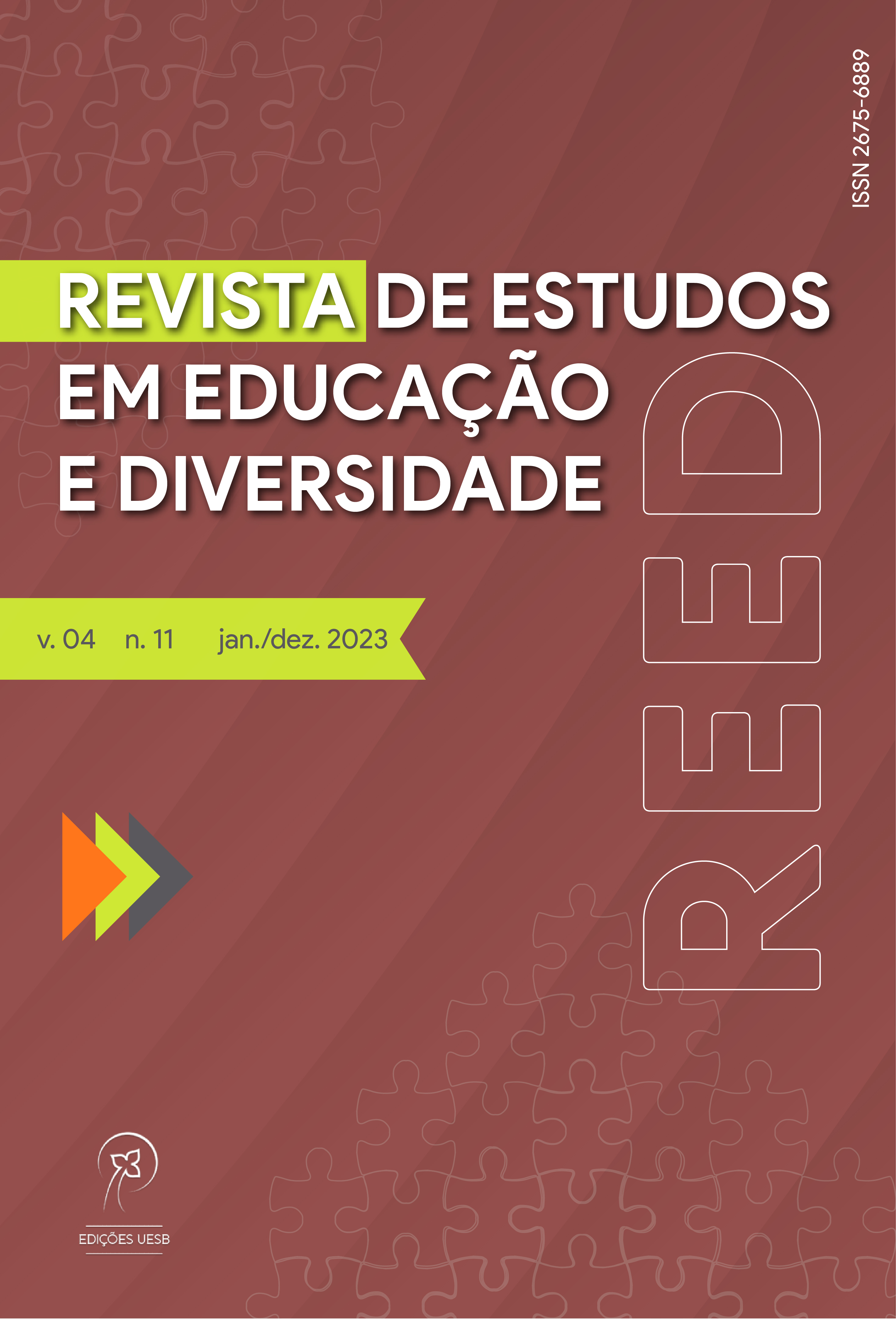Thinking about race in BNCC: a marxist analysis of the coloniality of knowledge in the chemistry curriculum in high school
DOI:
https://doi.org/10.22481/reed.v4i11.14002Keywords:
anticolonialism, BNCC, chemistry educationAbstract
This work aimed to conduct an analysis of the Brazilian National Core Curriculum (BNCC) for the Teaching of Sciences, specifically Chemistry, drawing on decolonial, anticolonial, and marxist theoretical frameworks to understand how the category of race is addressed in the text of this curriculum document. Historical-dialectical materialism (HDM) was employed as the research method and served as the foundational theory throughout the course of the work. The study was carried out as a documentary research, with excerpts related to human rights and race within the BNCC serving as the corpus for textual analysis, examined in the context of a dialogue with categories such as race, class, and the historical and social aspects of the document. Thus, the undertaken endeavor resulted in key outcomes: a bibliographic survey of the historical moment of BNCC production; an understanding of the curricular document as a policy that perpetuates a disposition where the condemned of the earth and the working class remain in their oppressed positions; and critiques of the impossibilities of envisioning a Chemistry curriculum within the BNCC that truly leads individuals from the working class to genuine emancipation and the overcoming of their oppressed conditions.
Downloads
References
APPLE, M. W. Produzindo diferença: neoliberalismo, neoconservadorismo e a política de reforma educacional. Linhas Críticas, [S. l.], v. 21, n. 46, p. 606–644, 2016.
BRASIL. Ministério da Educação. Base Nacional Comum Curricular. Brasília, 11 mai. 2018. Disponível em: http://basenacionalcomum.mec.gov.br/. Acesso em 22 out. 2022.
CASTRO-GÓMEZ, S.; GROSFOGUEL, R. Giro decolonial, teoría crítica y pensamiento heterárquico. In: CASTRO-GÓMEZ, Santiago; GROSFOGUEL, Ramon (orgs). El giro decolonial: reflexiones para uma diversidad epistêmica más allá del capitalismo global. Bogotá: Siglo del Hombre Editores, p. 9-24, 2007.
GUARNIERI, P. V.; LEITE, M. R. V.; CORTELA, B. S. C.; GATTI, S. R. T. História e Filosofia da Ciência na Educação Básica: Reflexões a partir da Base Nacional Comum Curricular. Alexandria: Revista de Educação em Ciência e Tecnologia, Florianópolis, v. 14, n. 2, p. 331-356, 2021.
IBGE – Instituto Brasileiro de Geografia e Estatística. Pesquisa Nacional por Amostra de Domicílios Contínua Trimestral - 1º Trimestre de 2023. Rio de Janeiro: IBGE, 2023.
LOPES, A. C. Por um currículo sem fundamentos. Linhas Críticas, [S. l.], v. 21, n. 45, p. 445–466, 2015.
MAGALHÃES, P. Bases anticoloniais para o ensino histórico-crítico de química: primeiras incinerações. Dissertação (Mestrado em Ensino, Filosofia e História das Ciências) - Faculdade de Educação, Universidade Federal da Bahia, Salvador, 2023. 392 p.
MARTINS, L. M.; LAVOURA, T. N. Materialismo histórico-dialético: contributos para a investigação em educação. Educar em Revista, Curitiba, v. 34, n. 71, p. 223-239, 2018.
MARX, K. O capital: crítica da economia política: livro I: o processo de produção do capital. 2. ed. São Paulo: Boitempo, 2017.
MECHEIN, M. Z.; VIGANO, S. M. M.; LAFFIN, M. H. L. F. Apontamentos para as pesquisas em educação a partir do materialismo histórico-dialético. Educação em Debate, Fortaleza, v. 40, n. 75, p. 90-103, 2018.
MIGNOLO, W. D. Colonialidade: o lado mais obscuro da modernidade. Revista Brasileira de Ciências Sociais, v. 32, n. 94, p. 1-18, 2017.
MOREIRA, A. F. B. Currículo: concepções, políticas e teorizações. In: OLIVEIRA, D. A.; DUARTE, A. M. C.; VIEIRA, L.M.F. DICIONÁRIO: trabalho, profissão e condição docente. Belo Horizonte: UFMG/Faculdade de Educação, 2010. CDROM.
NETTO, J. P. Introdução ao estudo do método de Marx. São Paulo: Expressão Popular, 2011. 64 p.
PINHEIRO, B. C. S. Educação em Ciências na Escola Democrática e as Relações Étnico-Raciais. Revista Brasileira de Pesquisa em Educação em Ciências, v. 19, p. 329–344, 2019.
QUIJANO, A. Colonialidade do poder e classificação social. In: SANTOS, Boaventura de Sousa; MENESES, Maria Paula (Orgs). Epistemologias do Sul. São Paulo: Cortez, 2010, p.73-118.
SANTOS, B. S. Para além do Pensamento Abissal: das linhas globais a uma ecologia de saberes. In: SANTOS, Boaventura de Sousa; MENESES, Maria Paula (Orgs). Epistemologias do Sul. São Paulo: Cortez, 2010, p. 23-72.
SAVIANI, D. Sobre a Natureza e a especificidade da educação. Germinal: marxismo e educação em debate, Salvador, v. 7, n. 1, p. 286–293, 2015.
SILVA, F. P.; BALTAR, P.; LOURENÇO, B. Colonialidade do Saber, Dependência Epistêmica e os Limites do Conceito de Democracia na América Latina. Revista de Estudos e Pesquisas sobre as Américas, [S. l.], v. 12, n. 1, 2018.
SILVA, M. M. da. Crítica à formação de competências socioemocionais na escola. Revista HISTEDBR On-line, Campinas, SP, v. 22, p. 10-20, 2022.
SIQUEIRA, R. M. Currículo e Políticas Curriculares em Análise na Perspectiva Histórico-Crítica: Ensino Médio e Química em Análise. 1 ed. Curitiba: Editora Appris, 2022, 297 p.
TONET, I. Educação contra o capital. 3 ed. São Paulo: Instituto Lukács, 2016. Disponível em: http://caxias.pege.com.br/gestor/fotos/acervo_digital/eb9c033225.pdf. Acesso em: 22 de out. 2022.
Downloads
Published
How to Cite
Issue
Section
License
Copyright (c) 2023 Revista de Estudos em Educação e Diversidade - REED

This work is licensed under a Creative Commons Attribution 4.0 International License.
You are free to:
Share - copy and redistribute the material in any medium or format; Adapt - remix, transform, and build from the material for any purpose, even commercially. This license is acceptable for Free Cultural Works. The licensor cannot revoke these freedoms as long as you follow the terms of the license.
Under the following terms:
Attribution - You must appropriately give credit, provide a link to the license, and indicate if any changes have been made. You may do so in any reasonable way, but not in a way that suggests that you or your use is endorsed by the licensor.
There are no additional restrictions - You cannot apply legal terms or technological measures that legally restrict others to make any use permitted by the license.






